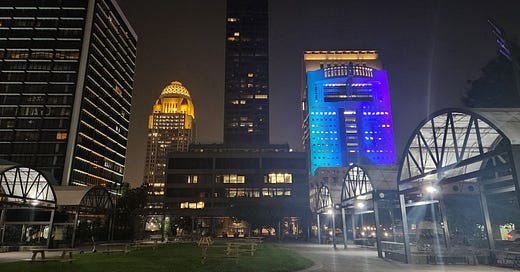A Bad Night for Urbanists in Louisville
The past decade or so has been defined by slow but continuous progress in Louisville. While it has been incredibly frustrating as a life-long resident that the rate of progress here has not met the rate of other cities, I cannot deny that things have generally continued to get better for many of the urban neighborhoods in the city. Subjectively and objectively, we are recovering pretty well from COVID. Our downtown core is a bit less gutted than it used to be, with downtown housing projects such as the Grey on Ali and Starks Building conversion down the pipeline. NuLu continues to see pretty rapid development. We have seen a (albeit not enough) surge of streetscape redesign projects and a rapid increase in protected bike infrastructure.
I bring this all up in order to make the next part hurt a bit less. The urbanist future that was maybe brimming on the horizon is likely to disappear. Donald Trump was elected president and his agenda, evident in Project 2025, will be detrimental for cities, especially ones where progress has been slow in the past years. Many of the positive projects going on around the city rely on federal grants that soon will be hard to come by, if they exist at all. Reimagine Ninth Street and Broadway all the Way are only possible through federal funding, for example.
In addition to the implications of federal elections, the local elections paint a dire picture. Republicans now make up 12 of the 26 seats on the Metro Council, winning every single contested race. These seats, not surprisingly, are all suburban. Republicans rarely care about walkability, transit access, mobility, and the like and neither do suburban folks. It will become even harder to pass any ordinances that focus on real positive change in the urban core. The few reforms we have ongoing, such as the missing middle housing reforms already stifled by the state, may not survive as suburban democrats may not have the political will to defend them.
Other than losing out on transformative projects, Louisville may begin to decline in other ways. Lack of housing reform will lead to an even bigger deficit of housing units, and housing will get even more expensive if demand does not decrease pretty rapidly. What housing is built will largely conform to existing zoning, which incentivizes the construction of suburban single-family homes and strip malls. The pattern of fiscally unsustainable development will continue, and eat away at the city budget. TARC’s budget crisis will go unaddressed by the metro council.
I am not a chronic pessimist nor do I revel in the decline of Louisville, but it is happening to our city and we need to be real about it. The doom loop view of urbanism in Louisville is something that should be avoided, though. Not because it is a completely unrealistic view of things, but rather because it ruins any chance of preventing the worst case scenario.
Despite all the negativity, we do still have great people in Louisville that are fighting for urbanism and healthy design. J.P. Lyninger, who recently primaried the democratic incumbent in district six, is probably the most pro-transit metro council member of my lifetime. Council members Shameka Parrish-Wright and Ben Reno-Weber have also generally been pretty good voices for walkability, healthy development patterns, transit, and the like and do not have as much of an electoral reason to cower to suburban fears. Local organizations like Streets for People, Old Louisville Mobility Coalition, and Strong Towns will continue to give a voice to urbanists, even if those in power are less inclined to listen.
While it feels like we are taking a beating right now, Louisville is still worth fighting for.





